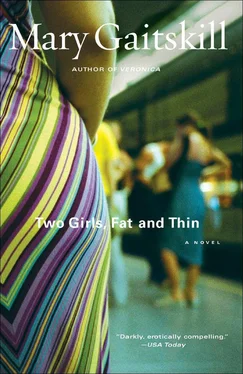Mary Gaitskill - Two Girls, Fat and Thin
Здесь есть возможность читать онлайн «Mary Gaitskill - Two Girls, Fat and Thin» весь текст электронной книги совершенно бесплатно (целиком полную версию без сокращений). В некоторых случаях можно слушать аудио, скачать через торрент в формате fb2 и присутствует краткое содержание. Год выпуска: 2012, Издательство: Simon & Schuster, Жанр: Современная проза, на английском языке. Описание произведения, (предисловие) а так же отзывы посетителей доступны на портале библиотеки ЛибКат.
- Название:Two Girls, Fat and Thin
- Автор:
- Издательство:Simon & Schuster
- Жанр:
- Год:2012
- ISBN:нет данных
- Рейтинг книги:5 / 5. Голосов: 1
-
Избранное:Добавить в избранное
- Отзывы:
-
Ваша оценка:
- 100
- 1
- 2
- 3
- 4
- 5
Two Girls, Fat and Thin: краткое содержание, описание и аннотация
Предлагаем к чтению аннотацию, описание, краткое содержание или предисловие (зависит от того, что написал сам автор книги «Two Girls, Fat and Thin»). Если вы не нашли необходимую информацию о книге — напишите в комментариях, мы постараемся отыскать её.
Review) create a haunting and unforgettable journey into the dark side of contemporary life and the deepest recesses of the soul.
Two Girls, Fat and Thin — читать онлайн бесплатно полную книгу (весь текст) целиком
Ниже представлен текст книги, разбитый по страницам. Система сохранения места последней прочитанной страницы, позволяет с удобством читать онлайн бесплатно книгу «Two Girls, Fat and Thin», без необходимости каждый раз заново искать на чём Вы остановились. Поставьте закладку, и сможете в любой момент перейти на страницу, на которой закончили чтение.
Интервал:
Закладка:
“I shall accompany you,” said Bernard.
They went to a Chinese restaurant with broken ocher and black tiles, smeared walls, and crabbed, tiny waitresses. A group of exhausted, sweaty waiters in dingy white kitchen uniforms sprawled around a back table smoking and muttering to each other. They looked at Justine and Bernard with incurious distaste.
They ordered mushroom fried rice with green peas and lurid red spare ribs. They shared from the plates, eating the meat with their fingers. Bernard discussed his endeavors and accomplishments. He was majoring in linguistics at NYU, where he hoped to found a student Definitist group. He was minoring in economics. He was teaching himself Japanese in his spare time. He was studying art history. He was translating The Hunchback of Notre Dame into Hebrew. He was putting himself through school by working in computer programming.
“I am taking as my model Jesus Delorean Dilorenzo Michaelangelo in The Gods Disdained . Maximum achievement, the highest you are capable of. None of this ‘well, maybe I can’t.’”
He chewed his rice and peas exuberantly. A kitchen boy tossed a lank strand of hair off his forehead and sneered.
“Although it looks as though I am going to be let go from my job. But, so what?” He shrugged. “Frank Golanka was fired twice in The Bulwark , right? For much the same reason. My co-workers do not like me. Very few people like me. Also like Frank Golanka I have no friends.”
“Aren’t other Definitists your friends?”
“Not really.” He looked at her, part of his face bright-eyed and smug, the other part desolate and frozen. “Every now and then a few people come into my life who seem to be friends. But they eventually disappear.”
She was touched. The expression on his face suddenly appeared to have been molded by hostile, alien hands, as if he were an unfortunate putty dwarf created to play the patsy in a sadomasochistic cartoon, the jargon he mouthed about the sanctity of the individual part of the mean joke.
“You must be lonely,” she said.
Surprise softened his face and made it vulnerable; he wasn’t used to hearing concern expressed on his behalf. She wanted to stroke his oily cheek.
“Yes, it is lonely. It is always lonely to stand apart from the crowd. One wishes to meet another with whom one has matching components.”
Justine tried to see this as an entertaining experience, but she felt disoriented and sad; she did not even consider the horror with which the Justine of Action, Illinois, would have viewed this situation. Beyond the dirty window pane was gray sky, mist. They and this dingy room, with its sticks of furniture and inhabitants, could be afloat in an envelope of mist, unconnected with anything on earth, as in a serious play about ideas, where tense characters assemble on a bare stage and talk about life or society, with no life or society anywhere in sight. If this were one of those plays, what lines would the kitchen boys have? What would they think of the conflict between the individual and the herd, the choice between rationality and irrationality? She thought of photographs she’d seen of thousands of Chinese in identical gray shirts, thrusting red books into the air. Would their lines give the subject a special Chinese perspective? Or would they remain silent, their presence meant merely to represent society watching as the individuals hashed it out?
“What about yourself?” asked Bernard. “Do you find yourself often alone?”
“Yes.”
“I thought so.”
“How could you tell?”
“By your arrogance. You are very arrogant. I mean that as a compliment.”
Again she thought of Dorothy. She wondered if a large proportion of Definitists were victims of disturbed families.
“What about your family?” she asked. “Do you have a decent relationship with them?”
“Not a very Definitist question. I don’t have any relationship with them. They are beaten, weak people. My father was cautious and full of false humility. Of my mother there is even less to say. She peeled potatoes. She wore no makeup. She was religious.”
Justine imagined little Bernard in the appalling bosom of his family. The father was a wretch, the mother a shadow. There was a bowl of lumpy potatoes for dinner, shoes left in the middle of the floor, used Kleenex crumpled on the couch, a black-and-white television on the blink. Bernard rarely went outside; he had no friends. Shunned on the school playground, he squatted alone, collecting pebbles and pieces of colored glass. Without naming her, Justine thought of Emotional and felt a pang.
Despite his physical ugliness, surely Bernard wasn’t an unpleasant child. There was a gentle, sensitive place in his meaty soul, a place from which he viewed the world as he sat alone on the playground, appreciating its hues of sadness and moments of joy. From this spot he arranged his perception into fantasies of beauty and strength, glory and striving, fantasies he nursed deep within himself. His mother’s bleak pain, his father’s emptiness, the contempt of his schoolmates, all menaced and tortured his inner self until it developed a callused, horned armor. Through this armor his deformed sensitivity strained to find the thundering abstracts of beauty and heroism that consoled it and discovered Anna Granite.
Justine walked silently beside Bernard on their way to the lecture hall, listening to him discuss the fine points of Definitism. She had rancorous thoughts about the kind of world that could turn a child into a pontificating maniac.
They arrived at the hall late. Dr. Bean was already giving his speech to a crowd of about two hundred people. They sat too far back for Justine to get a good look at him; she could only see a grotesquely tall figure clutching the podium with both hands. He wore glasses and his long hair played with suppressed hysteria about his shoulders. He spoke as though describing something that had been done to him recently at the hands of a mob.
“What we’re seeing is a systematic attempt to de-rationalize and de-Americanize the educational system of this country. This is something that started in the forties and has gradually wormed its way into respectability. One of the first signs of this change was the mass acceptance of a book by a supposed scientist, Hilma Feeney, who went to live in the primitive island culture of Patagandria, came back, and wrote a book about how wonderful this primitive culture was — implying, quite clearly, that it is better to be a naked, bead-making Patagandrian living in a hut without so much as an outhouse than an American with houses, cars, skyscrapers, shopping centers, and art. That this work was hailed not only by anthropologists but by the public, was one of the first danger signs — recognized as such by Anna Granite herself, who attacked it as the perfidious evil it was when it first appeared. But it didn’t stop there.”
“I think I’m going to go to the train station,” whispered Justine. “I want to get back early.” She got up and turned to say good-bye. To her dismay, Bernard stood and said, “I’ll accompany you.” To her disgust, he put his hand on her shoulder. In this way, they walked out into the rain.
Chapter Fourteen
The night after I did the interview with Justine Shade, I transformed it into a wonderful story which I told to proofreaders Debby and Sandra. We discussed Ms. Shade during our break over a metal tray of crumbling company-supplied cookies and Stryofoam cups of coffee.
“Do you really think she’s who she says she is?” asked Sandra. “I mean, what kind of reporter would dress like that?”
“And reporters use tape recorders, not note pads,” added Debby, picking some chapped extranea from her pink-coated lips. “Did she have any kind of I.D.?”
Читать дальшеИнтервал:
Закладка:
Похожие книги на «Two Girls, Fat and Thin»
Представляем Вашему вниманию похожие книги на «Two Girls, Fat and Thin» списком для выбора. Мы отобрали схожую по названию и смыслу литературу в надежде предоставить читателям больше вариантов отыскать новые, интересные, ещё непрочитанные произведения.
Обсуждение, отзывы о книге «Two Girls, Fat and Thin» и просто собственные мнения читателей. Оставьте ваши комментарии, напишите, что Вы думаете о произведении, его смысле или главных героях. Укажите что конкретно понравилось, а что нет, и почему Вы так считаете.












